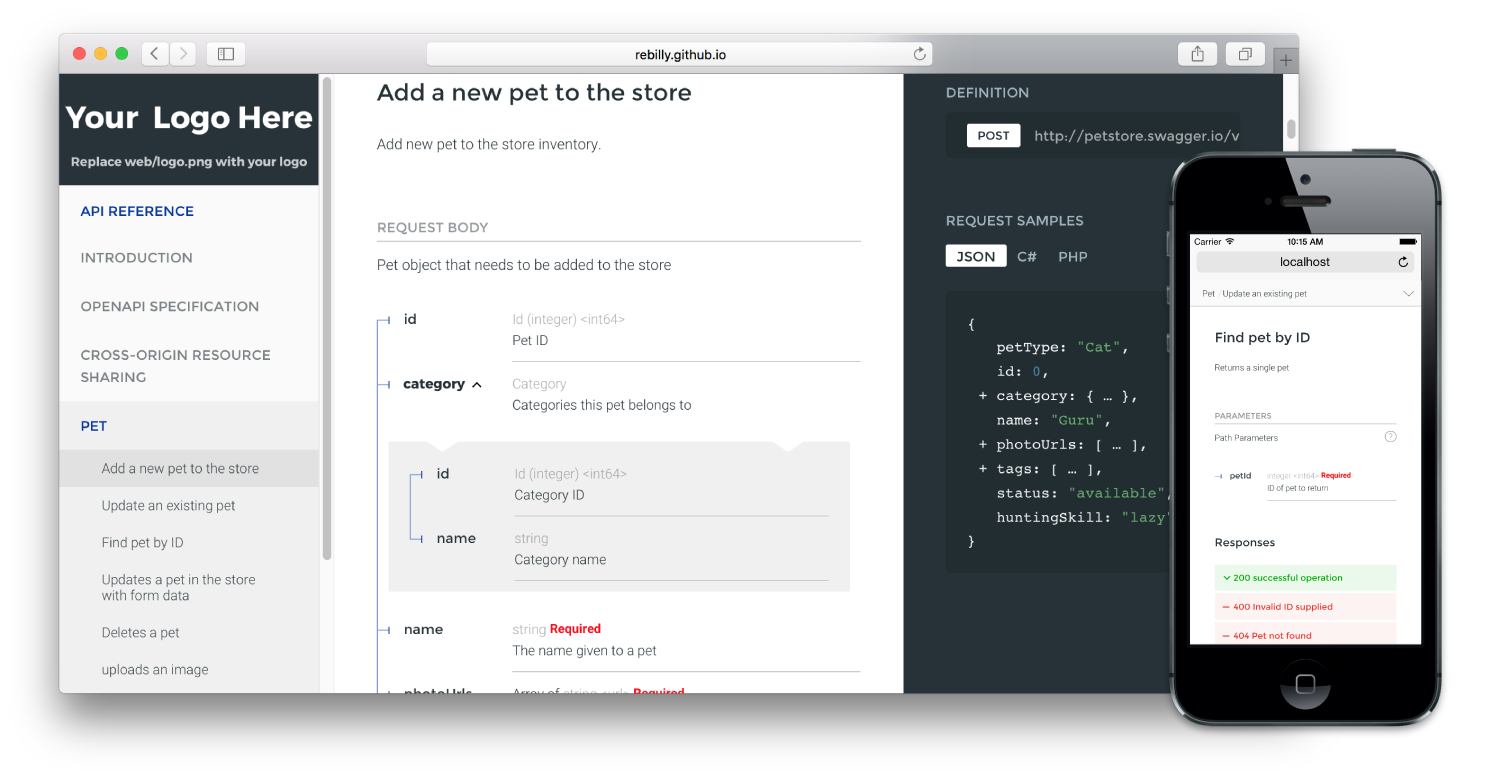mirror of
https://github.com/Redocly/redoc.git
synced 2026-02-05 22:49:28 +03:00
📘 OpenAPI/Swagger-generated API Reference Documentation
api-documentationdocumentation-generatordocumentation-toolhacktoberfestopenapiopenapi3openapi31openapi-specificationreactjsredocstarred-redocly-repostarred-reposwagger
| build | ||
| demo | ||
| docs | ||
| lib | ||
| tests | ||
| typings | ||
| .codeclimate.yml | ||
| .eslintignore | ||
| .gitignore | ||
| .npmignore | ||
| .travis.yml | ||
| bower.json | ||
| CHANGELOG.md | ||
| gulpfile.js | ||
| karma.conf.js | ||
| LICENSE | ||
| package.json | ||
| protractor.conf.js | ||
| README.md | ||
| system.config.js | ||
| tsconfig.json | ||
| tslint.json | ||
| typings.json | ||
ReDoc
OpenAPI/Swagger-generated API Reference Documentation
Live demo
Features
- Extremely easy deployment
- It’s free and open-source project under MIT license
- The widest OpenAPI features support (yes, it supports even discriminator)
- Neat documentation for nested objects
- Code samples support (via vendor extension)
- Responsive three-panel design with menu/scrolling synchronization
- Integrate API introduction into side menu - ReDoc takes advantage of markdown headings from OpenAPI description field. It pulls them into side menu and also supports deep linking.
Roadmap
- docs pre-rendering (performance and SEO)
- ability to simple customization
- built-in API Console
Releases
We host latest and all the previous ReDoc releases on GitHub Pages-based CDN:
latestrelease: https://rebilly.github.io/ReDoc/releases/latest/redoc.min.js- particular release, e.g.
v0.16.1: https://rebilly.github.io/ReDoc/releases/v0.16.0/redoc.min.js
Deployment
TL;DR
<!DOCTYPE html>
<html>
<head>
<title>ReDoc</title>
<!-- needed for adaptive design -->
<meta name="viewport" content="width=device-width, initial-scale=1">
<!--
ReDoc doesn't change outer page styles
-->
<style>
body {
margin: 0;
padding: 0;
}
</style>
</head>
<body>
<redoc spec-url='http://petstore.swagger.io/v2/swagger.json'></redoc>
<script src="https://rebilly.github.io/ReDoc/releases/latest/redoc.min.js"> </script>
</body>
</html>
That's all folks!
1. Install ReDoc (skip this step for CDN)
Install using bower:
bower install redoc
or using npm:
npm install redoc --save
2. Reference redoc script in HTML
For CDN:
<script src="https://rebilly.github.io/ReDoc/releases/latest/redoc.min.js"> </script>
For bower:
<script src="bower_components/redoc/dist/redoc.min.js"> </script>
For npm:
<script src="node_modules/redoc/dist/redoc.min.js"> </script>
3. Add <redoc> element to your page
<redoc spec-url="url/to/your/spec"></redoc>
4. Enjoy 😄
Configuration
Swagger vendor extensions
ReDoc makes use of the following vendor extensions:
x-logo- is used to specify API logox-traitTag- useful for handling out common things like Pagination, Rate-Limits, etcx-code-samples- specify operation code samples
<redoc> tag attributes
spec-url- relative or absolute url to your spec file;scroll-y-offset- If set, specifies a vertical scroll-offset. This is often useful when there are fixed positioned elements at the top of the page, such as navbars, headers etc;scroll-y-offsetcan be specified in various ways:- number: A fixed number of pixels to be used as offset;
- selector: selector of the element to be used for specifying the offset. The distance from the top of the page to the element's bottom will be used as offset;
- function: A getter function. Must return a number representing the offset (in pixels);
suppress-warnings- if set, warnings are not rendered at the top of documentation (they still are logged to the console).
Advanced usage
Instead of adding spec-url attribute to the <redoc> element you can initialize ReDoc via globally exposed Redoc object:
Redoc.init(specUrl, options)
options is javascript object with camel-cased version of <redoc> tag attribute names as the keys, e.g.:
Redoc.init('http://petstore.swagger.io/v2/swagger.json', {
scrollYOffset: 50
})
Development
Running local dev-server
- Clone repository
git clone https://github.com/Rebilly/ReDoc.git - Go to the project folder
cd ReDoc - Install node modules and front-end dependencies
npm install
npm run jspm-install
- (optional) Replace
demo/swagger.jsonwith your own schema - Start the server
npm start - Open
http://localhost:9000




